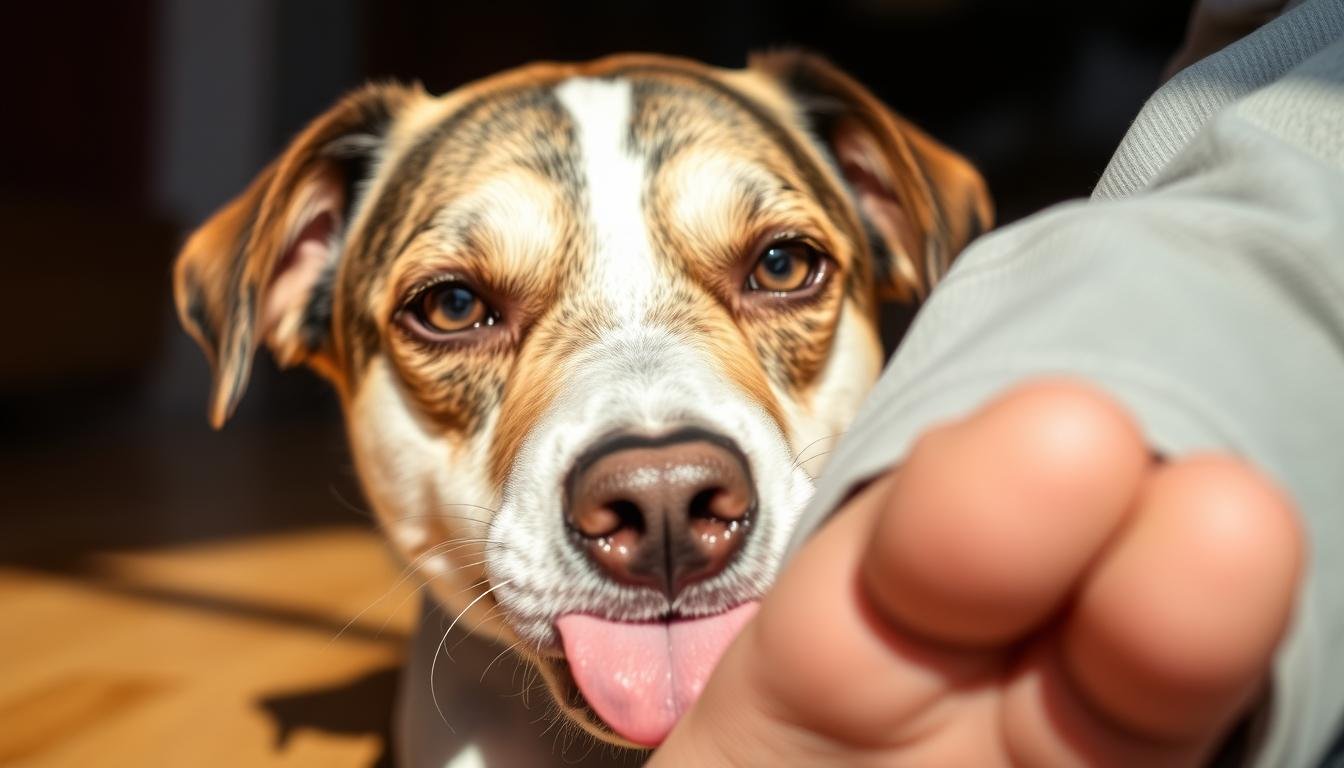If your dog is constantly licking your feet, you’re not alone, and no, it’s not just because they taste salty! Dogs lick feet for a lot of reasons, from showing affection and seeking attention to exploring scents and soothing themselves. Don’t worry about this behavior; it’s naturally rooted in instinct, communication, and sometimes even boredom. While it may feel ticklish or strange, usually when you see your dog licking your feet, it’s a natural habit that is harmless.

The Science Behind Dog Licking Behavior
The act of licking is a complex behavior in dogs that is influenced by various neurological and evolutionary factors. As you observe your dog licking your feet, it’s essential to understand the underlying mechanisms that drive this behavior.
How Licking Affects a Dog’s Brain
Licking triggers the release of endorphins, often referred to as “feel-good” hormones, in a dog’s brain. This neurological response is crucial as it helps reduce stress and creates a sense of calm, making licking a self-soothing behavior for many dogs. The repetitive motion of licking has a calming effect, which is why some dogs continue to lick as a way to relax.
Endorphins play a significant role in this process, as they are the body’s natural painkillers and mood elevators. By releasing endorphins, licking helps your dog manage anxiety and stress, contributing to their overall emotional well-being.
Licking as Natural Canine Communication
Licking is not just a self-soothing behavior; it is also a vital form of communication for dogs. From a young age, puppies learn to lick as a way to interact with their mothers and littermates. This behavior continues into adulthood, where dogs use licking to gather information about their environment and the people around them.
Dogs explore their world using their tongues, much like humans use their hands. By licking, your dog can gather valuable information about scents, tastes, and textures, helping them understand their surroundings better. This natural behavior is essential for canine communication and interaction.
Why Does My Dog Lick My Feet? 7 Common Reasons
Understanding why your dog licks your feet can provide insight into their behavior and strengthen your bond. Dogs exhibit a range of behaviors that can be puzzling to their owners, and foot licking is one of them. This action can be attributed to various reasons, and understanding these motivations is key to addressing the behavior.
Showing Affection and Strengthening Bonds
Dogs often lick their owners’ feet as a way of showing affection. In the canine world, licking is a powerful means of expressing love and strengthening bonds. Much like humans giving hugs or kisses, dogs use licking to reinforce their connection with their human family members. This behavior is rooted in their pack mentality, where licking helps to establish and maintain social bonds.
Gathering Information Through Scent
Dogs have an extraordinary sense of smell, and they use licking as one of the ways to gather information about their environment and the people in it. Feet, in particular, are interesting to dogs because they collect a variety of scents from the ground and other surfaces. By licking your feet, your dog is able to gather data about where you’ve been and what you’ve done.
Enjoying the Salty Taste
Believe it or not, dogs often enjoy the salty taste of human skin, especially after sweating. Human feet can be particularly salty due to sweat, making them appealing to dogs who naturally enjoy salt. This enjoyment can be a simple yet significant reason why your dog is drawn to licking your feet.
Seeking Attention from Their Owners
Sometimes, licking is simply a way for your dog to get your attention. Dogs learn that licking feet often results in a reaction from their owners, whether it’s laughter, talking to them, or even scolding. This attention can reinforce the behavior, making it a habitual action for your dog.
Self-Soothing and Anxiety Relief
Anxiety can trigger repetitive behaviors in dogs, including licking. For some dogs, licking serves as a self-soothing mechanism, releasing endorphins that help calm them during stressful situations. If your dog is experiencing anxiety, licking your feet might be a coping strategy.
| Reason | Description |
|---|---|
| Showing Affection | Dogs lick to show love and strengthen bonds. |
| Gathering Information | Dogs use licking to gather scents and information. |
| Enjoying the Salty Taste | Dogs are drawn to the salty taste of human skin. |
| Seeking Attention | Licking can be a way for dogs to get attention from their owners. |
| Self-Soothing | Licking can be a mechanism for dogs to calm themselves. |
| Boredom | Lack of stimulation can lead to foot licking. |
| Bedtime Routine | Some dogs incorporate foot licking into their bedtime routine. |
Boredom and Lack of Stimulation
If your dog isn’t getting enough mental stimulation or physical exercise, they might lick your feet out of boredom. Dogs need activities to keep them engaged, and without sufficient stimulation, they may resort to licking as a way to entertain themselves.
Part of Their Bedtime Routine
If your dog tends to lick your feet right before bedtime, this behavior might be more than just a quirky habit—it could be part of their nighttime routine. Some dogs find comfort in licking their owners’ feet as a way to wind down and feel secure before sleeping.
By understanding these 7 common reasons, you can better address why your dog licks your feet and take appropriate actions to either encourage or discourage the behavior based on your preferences and your dog’s needs.
The Fascinating Connection Between Dogs and Human Feet
Your dog’s fascination with your feet is more than just a quirky behavior; it’s a complex interaction driven by scent, taste, and instinct. Dogs are drawn to human feet for various reasons, primarily due to the wealth of information they can gather from them.
Human feet are a treasure trove of scents, thanks to the numerous sweat glands they contain. These glands produce a concentrated source of scent information that dogs can analyze. The unique combination of pheromones and sweat makes feet particularly interesting to dogs.
Why Feet Are Particularly Interesting to Dogs
Feet are packed with interesting smells and pheromones, making them a fascinating subject for canine investigation. The sense of smell in dogs is between 10,000 and 100,000 times more powerful than in humans, allowing them to detect subtle nuances in scent that are imperceptible to us.
The texture and accessibility of feet also make them an easy target for curious dogs. Often exposed or covered only by thin socks, feet provide a readily available source of information. Dogs can “read” information about your health, emotional state, and recent activities just by smelling and licking your feet.
How Your Feet “Talk” to Your Dog
When your dog licks your feet, they’re not just showing affection; they’re gathering a wealth of information. The unique scent profile of each person’s feet helps dogs identify and distinguish between different family members. Environmental factors that feet encounter, such as different surfaces, other animals, and foods, create an ever-changing “story” that keeps dogs interested in this form of investigation.
The information gathered from feet can tell dogs what you’ve been eating, where you’ve been, and even how you’re feeling. This complex communication is facilitated by the dog’s powerful olfactory system, which can detect pheromones and other chemical signals that are beyond human perception.
By understanding why dogs are so drawn to human feet, we can better appreciate the intricate bond between humans and dogs. This connection is built on a foundation of mutual interaction and communication, with scent playing a crucial role.
Is It Normal for Dogs to Lick Feet?
It’s natural to wonder if your dog’s habit of licking your feet is something to be worried about. Generally, occasional foot licking is considered a normal behavior for dogs, especially in puppies who are still exploring their surroundings. However, it’s essential to be aware of the potential risks associated with this behavior.
One of the primary concerns is the substances that might be on your feet, such as residues from lotions, sprays, or chemicals, which could be harmful if ingested. Ensuring good foot hygiene is crucial. Moreover, if the licking becomes obsessive, it might indicate an underlying issue that needs to be addressed.
Understanding Normal vs. Excessive Licking
Distinguishing between normal and excessive licking is vital. Normal licking is typically occasional and not persistent. On the other hand, excessive licking can be a sign of anxiety, boredom, or other underlying issues. Factors such as age, breed, and individual personality can influence a dog’s tendency to lick feet.
- Puppies often lick more as part of their developmental exploration.
- Some breeds are naturally more prone to licking due to their genetic predispositions.
- A dog’s past experiences can also shape their licking behavior.
Breed Tendencies and Licking Behavior
Different dog breeds exhibit different tendencies toward licking behaviors. Working breeds, hunting dogs, and breeds with specific historical purposes may display different licking patterns based on their genetic predispositions. For instance, some breeds are more inclined to lick due to their nurturing instincts.

Understanding these breed tendencies can help you assess your dog’s licking behavior more effectively. By considering factors such as breed, age, and individual personality, you can better determine whether your dog’s foot-licking behavior is normal or if it requires further attention.
When Foot Licking Becomes a Problem
Dog owners often wonder when their dog’s foot-licking behavior crosses the line from normal to problematic. While it’s common for dogs to lick their owner’s feet, excessive or obsessive licking can be a sign of an underlying issue.
Signs of Obsessive Licking Behavior
Identifying the signs of obsessive licking is crucial to addressing potential problems early. Some behaviors to watch out for include:
- Licking that continues even when distracted
- Licking to the point of causing irritation to human skin
- Becoming agitated when prevented from licking
If you notice any of these behaviors, it’s essential to consider that your dog’s licking might be more than just a habit.
Potential Health Issues Behind Excessive Licking
Excessive licking can be a sign of various health issues. Some potential medical conditions include:
| Condition | Description |
|---|---|
| Allergies | Can cause skin irritation, leading to excessive licking |
| Gastrointestinal Issues | Discomfort or pain may cause dogs to lick excessively |
| Neurological Problems | Can lead to compulsive behaviors like excessive licking |
| Cushing’s Disease | A hormonal disorder that can cause increased licking |
| Diabetes | May lead to changes in behavior, including excessive licking |
Emotional Triggers for Problematic Licking
Emotional and psychological factors can also contribute to excessive licking. These may include separation anxiety, general anxiety disorders, or past trauma. Changes in a dog’s environment or routine can trigger increased licking as a coping mechanism.
If you’re concerned about your dog’s licking behavior, it’s wise to consult with a veterinarian to rule out any underlying medical issues. Documenting your dog’s licking behavior, including frequency, duration, and circumstances, can help you effectively communicate your concerns with your vet.
Should You Let Your Dog Lick Your Feet?
If you’re wondering whether to let your dog lick your feet, you’re not alone. Many dog owners are faced with this decision daily. The answer depends on several factors, including health considerations for both you and your dog.
Health Considerations for Humans
When considering whether to let your dog lick your feet, it’s essential to think about the potential health implications for humans. Dog saliva contains bacteria that could potentially cause infections, especially if you have open wounds on your feet. People with compromised immune systems should be particularly cautious. While dog saliva has some antibacterial properties, it’s not a guarantee against infection.
- Bacterial transfer from dog to human is possible through licking.
- Open wounds on feet can become infected if licked by a dog.
- People with weakened immune systems are more susceptible to infections.
Health Considerations for Dogs
It’s also crucial to consider the health implications for your dog. If you’ve applied any chemicals, medications, or toxic substances to your feet, it’s not safe to let your dog lick them. Substances like psoriasis creams can be harmful to dogs. Ensuring your feet are clean and free from harmful substances is vital before allowing your dog to lick them.
Ultimately, whether to let your dog lick your feet is a personal decision that depends on your comfort level and your dog’s health. Setting consistent boundaries with your dog is key, regardless of your decision.
How to Stop Your Dog from Licking Your Feet
The persistent licking of feet by dogs can be managed through a series of straightforward techniques that redirect their behavior. Understanding why your dog engages in this activity is crucial, but equally important is knowing how to effectively stop it.
Redirecting the Behavior with Toys and Treats
One effective method to discourage foot licking is by redirecting your dog’s attention to an acceptable alternative. Providing a chew toy or a food puzzle can keep your dog occupied and satisfy their urge to lick. Another option is a lick mat, which allows your dog to indulge in licking behavior without targeting your feet.
Training Techniques to Discourage Licking
Training plays a vital role in modifying your dog’s behavior. By teaching your dog to respond to commands like “stop” or “leave it,” you can effectively deter them from licking your feet. Positive reinforcement is key; reward your dog with treats or praise when they choose not to lick your feet.
Consistency is crucial in training. Ensure that all family members are using the same commands and rewards to avoid confusing your dog.
Creating Physical Barriers
Implementing physical barriers can also be an effective strategy. Wearing socks or shoes around the house can deter your dog from licking your feet. This method is simple yet effective in breaking the habit.
Addressing Underlying Anxiety or Boredom
Sometimes, dogs lick feet due to underlying issues such as anxiety or boredom. Increasing exercise and providing mental stimulation can help alleviate these issues. Engaging your dog in interactive games or providing enrichment activities can redirect their energy and reduce the likelihood of foot licking.
By combining these strategies and maintaining consistency, you can effectively reduce your dog’s inclination to lick your feet. It’s about understanding their needs and providing appropriate alternatives.
When to Consult a Veterinarian About Licking
It’s not always clear when your dog’s licking behavior requires professional attention, but there are key signs to watch for. If your dog has suddenly started licking their paws a lot more, it could be a sign that they are stressed or anxious, or it might suggest that they are in pain, feeling nauseous, uncomfortable, or itchy.
Medical Conditions That May Cause Excessive Licking
Several medical conditions can cause excessive licking in dogs. These include allergies, skin infections, joint pain, and neurological disorders. For instance, allergies can cause skin irritation, leading to compulsive licking. Similarly, joint pain or arthritis might cause your dog to lick the affected area in an attempt to soothe it.
| Medical Condition | Symptoms |
|---|---|
| Allergies | Skin irritation, itching |
| Skin Infections | Redness, swelling, discharge |
| Joint Pain | Limping, stiffness, licking the affected joint |
Behavioral Issues That Require Professional Help
Excessive licking can also be a sign of underlying behavioral issues in your puppy or dog. Conditions such as obsessive-compulsive disorder (OCD) or severe anxiety can manifest as compulsive licking. If you suspect that your dog’s licking is due to a behavioral issue, it’s crucial to consult with a veterinarian or a veterinary behaviorist to get appropriate guidance and support.
When consulting a vet about your dog’s licking behaviour, be prepared to discuss your dog’s history, including any changes in their environment or routine. The vet may perform diagnostic tests to rule out underlying medical conditions. In some cases, a referral to a veterinary behaviorist might be necessary for specialized advice on managing your dog’s behaviour.

Conclusion
Your dog’s inclination to lick your feet is a complex behavior influenced by a mix of instinct, emotional connection, and environmental factors. Throughout this article, we’ve explored the various reasons behind this behavior, from showing affection and strengthening bonds to self-soothing and gathering information through scent.
It’s essential to recognize that foot licking is typically a normal canine behavior that serves multiple purposes. However, distinguishing between normal licking and excessive licking is crucial, as the latter may indicate underlying issues that require attention. By understanding your dog’s motivation for licking, you can strengthen your bond and better meet their needs.
For those who wish to discourage the behavior, consistency and positive reinforcement in training are key. Consider your puppy’s individual personality, breed characteristics, and history when interpreting their licking behavior. With proper understanding and appropriate training approaches, foot licking can be managed effectively if it becomes problematic.
Ultimately, behaviors like foot licking are part of what makes the human-canine relationship special and unique. By observing your dog’s behavior with newfound understanding and appreciation, you can deepen your connection and foster a more empathetic and supportive relationship.





